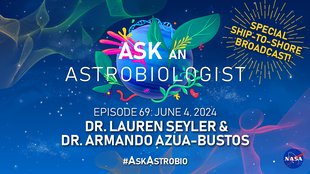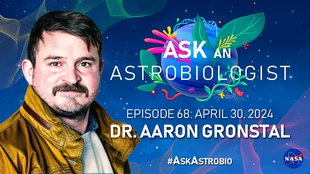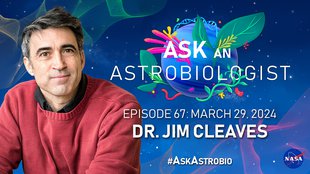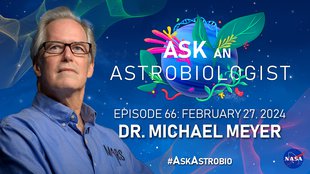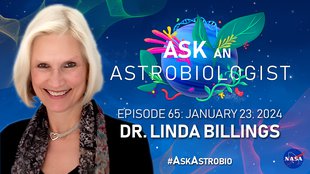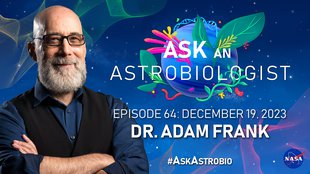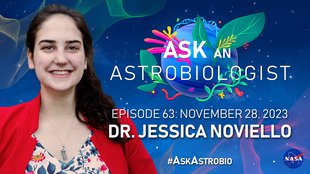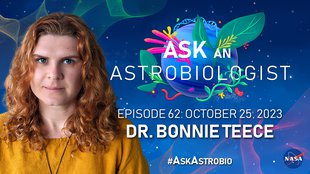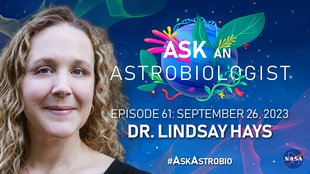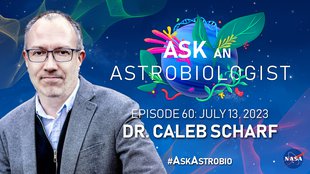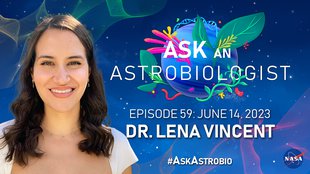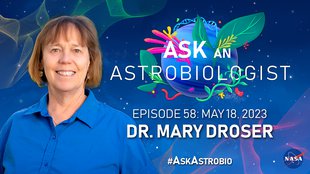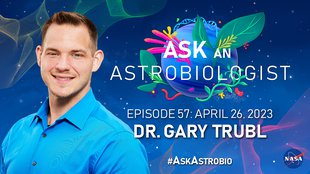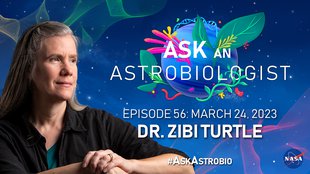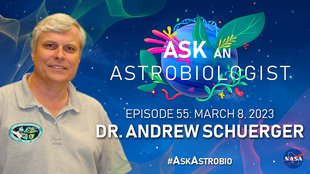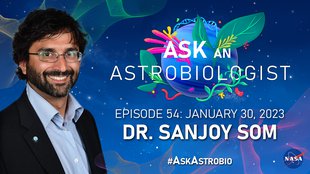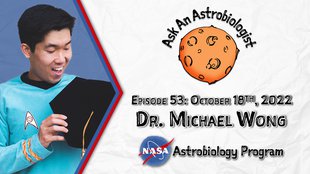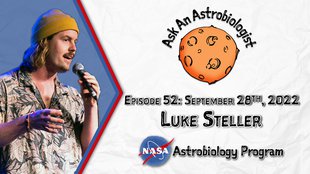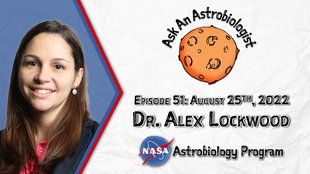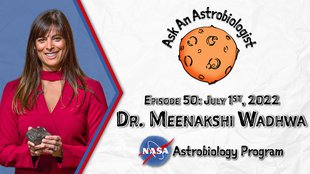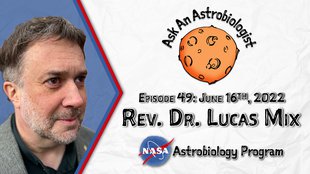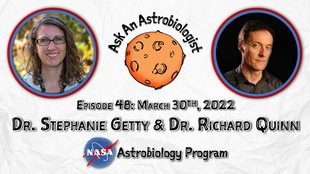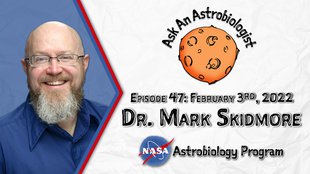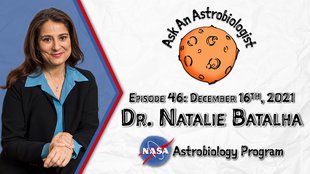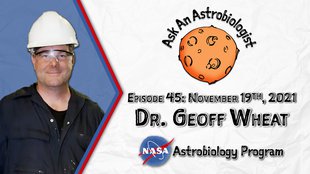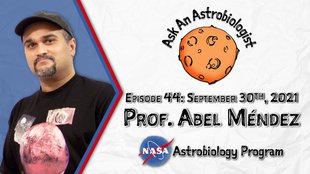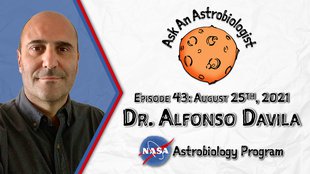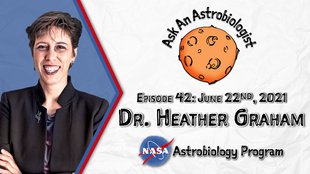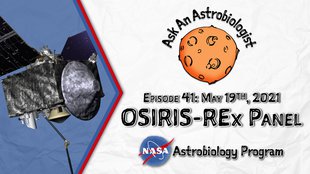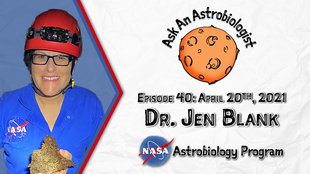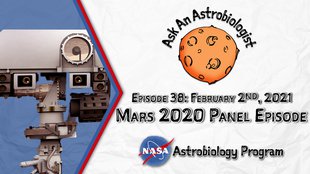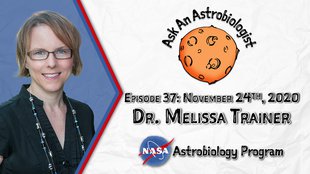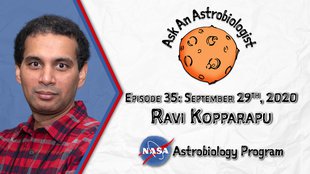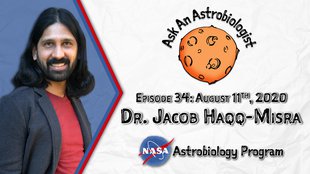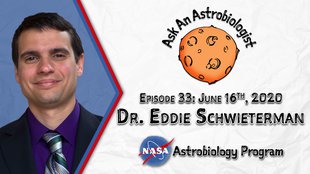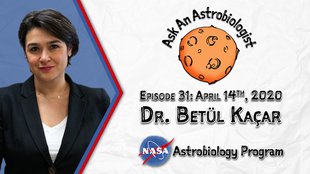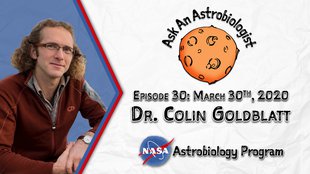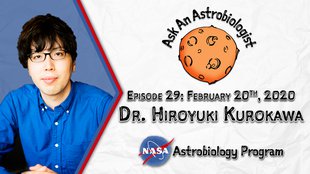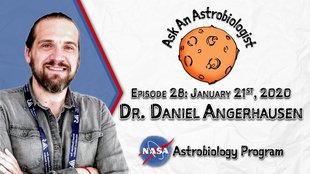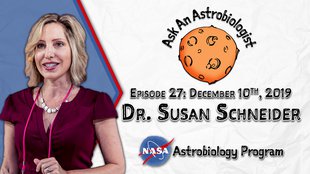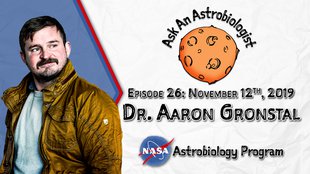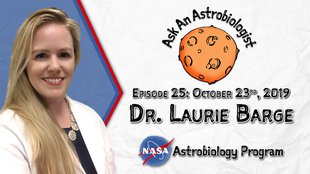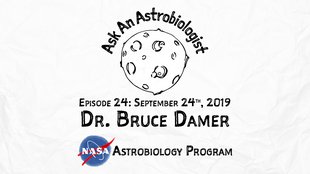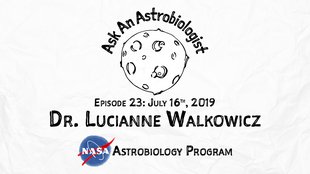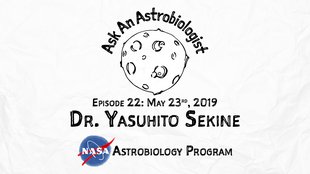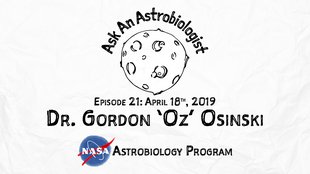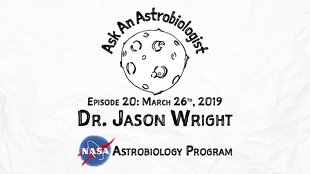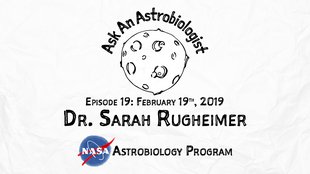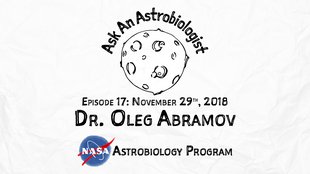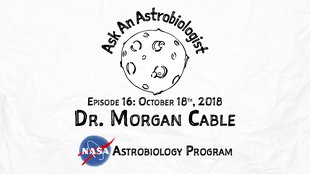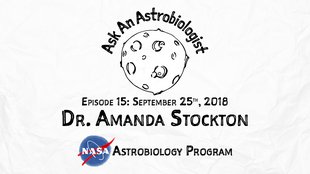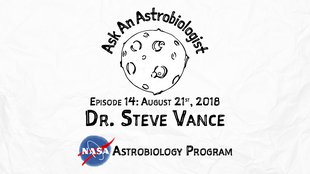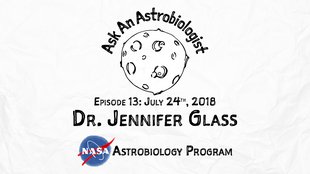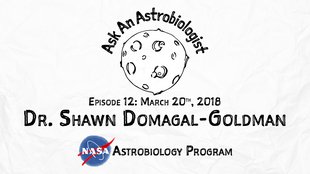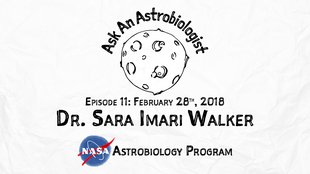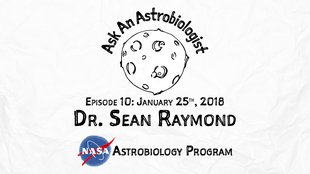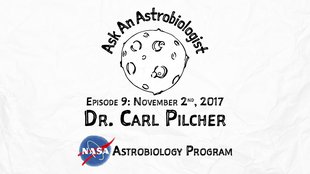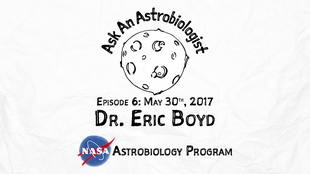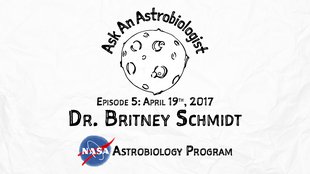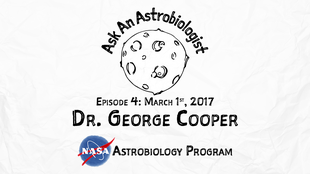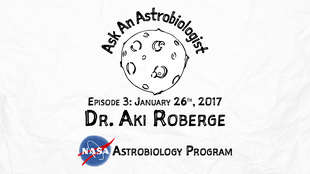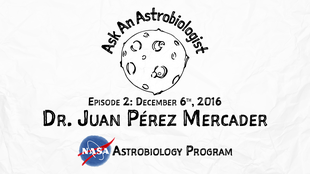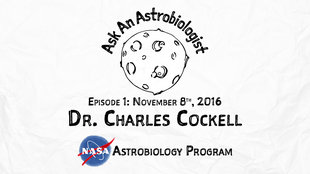
We welcome to SAGANet, Dr. Alexis Templeton, Associate Professor of Geology at the University of Colorado, Boulder! Dr. Templeton is a Geomicrobiologist with expertise in microbe/mineral interactions, biomineralization, chemical imaging, spectroscopy, and isotope geochemistry.
You can find out more about her work here.
Greetings, friends of astrobiology. Welcome back to a brand new episode of Ask an Astrobiologist. This show is made possible by contributions from the NASA Astrobiology Program, ELSI, the Earth-Life Science Institute, and the nonprofit, Blue Marble Space. In this show, we celebrate science and celebrate scientists. Today is no different. My name is Sanjoy Som. We are very lucky to have Dr. Alexis Templeton of the University of Colorado at Boulder as our guest today, but first, it's your monthly background quiz.
Other Recent Episodes
Ocean World Science Aboard the Ship 'Falkor Too' with Drs. Lauren Seyler & Armando Azua-Bustos
The Art of How to Become an Astrobiologist with Dr. Aaron Gronstal
How & When Do Molecules Become Life with Dr. Henderson "Jim" Cleaves
Mike, if you could put up the background from last month where we featured these very strange shapes from a land far, far away, at least from our studio here in California in the United States. One person got it right. Congratulations, Shana Kendall, who's tweeting as @NASAJPLFan, who correctly identified the site as the Pilbara in Western Australia. These features are actually evidence of life that occurred on Earth three billion years ago. They're called stromatolites. They're essentially microbial mats that were building up in shallow water. They're looking for the light. As they go up, they have little filaments that baffle the water. The sediments drop and the cones grow. Because they are a baffling sediment, rock lasts a long time and they are now available for scientists to study. This is why life on Earth existed three billion years ago. It's almost goosebump-generating.
This month, this is the background. Hopefully it's a lot easier for you guys because on Monday, a spacecraft called Juno, overflew this feature at an altitude of 9,000 kilometers, so grazing the surface of this environment, and I welcome you to share with us what you think this environment is. You can do it either on the SAGANet chat, or on Twitter, with #AskAstrobio. If at any time during this interview you have questions for Dr. Templeton, please use #AskAstrobio on Twitter to let us know, or use the SAGANet.org chat.
All right, enough of me talking. Welcome, Dr. Alexis Templeton. Again, professor of geological science at the University of Colorado Boulder, as well as the lead principle investigator of the NASA Astrobiology Institute's team Rock Powered Life, and we'll talk a little bit about that during this interview. But first, Alexis, thank you so much for being here with us today.
Hi, Sanjoy. It's great to see you. I always love talking with you.
Thank you. As we like to start in these interviews is actually turn back the wheels of time a little bit. To begin, how did you become a scientist as a kid? Was there any particular events or stories that triggered this lifelong interest in science?
That's a good question. It took a long time, I think, for me to recognize myself as a scientist. I think I always had an adventurous spirit, so that was more of my earlier lifestyle was really enjoying being out and traveling in the world, both with my family, and then over time I did a lot of outdoor programs, the equivalent of Outward Bound, and NOLS, and Outdoor Educator programs. That drove me to go to interesting places. Then I started to ask questions about the landscapes I was in and found myself sucked into the field I am in now, in the geosciences. I would never have guessed growing up I'd be a geologist by training, but that underlying interest in chemistry and in outdoors came together in that way.
Indeed. Rocks are the history books of the planet. Learning how to read them uncovers the most incredible story, at least I find them, perhaps I'm a bit biased, that one has ever looked at. But you are also a microbiologist, right? Your current research deals a lot with microbes. How did that path unfold at university and beyond?
I didn't take any biology, actually, in high school or college. I probably shouldn't admit that. But I was working in New Zealand after my undergraduate. I was doing a master's down there. Again, I was really interested in dynamic landscapes. I'd gone to New Zealand because there are mountains that are forming today. They rise three kilometers up from the ocean through active-plate tectonics.
I went to study the chemistry of the hydrothermal systems in New Zealand and to do that through isotope tracers and other geochemical tracers that we are using. Every time we tried to interpret the signals in the minerals we were studying, they didn't make sense through any of our models. I had to start reading microbiology literature. At this point in time, it was in the early '90's. The only process that would make sense for the signals we were seeing was that there was organisms making methane. I didn't know much about microbial methanogenesis, but it was the first metabolism that I learned about.
I later was given a job. I worked for the U.S. government working on bioremediation. Because of that research, I started to learn how do you trace signals of biological activity? I essentially started to learn microbiology on the job. I was given opportunities to take classes, and go to biology departments, and embed microbiology into my research. It came from the side rather than a directed course of study that I did earlier on in my career.
It becomes clear that it's harder and harder to untangle geological processes from biological processes. They overlap quite a lot. You mentioned bioremediation, which is of course the use of microbes to fight pollutants caused by human activity. Is that something that you're still pursuing, and in what environments, what kind of pollutants were you fighting against?
Yeah, I'm not working in that area anymore, although I teach some aspects of that. When I've taught the equivalent of geomicrobiology classes, we look a lot at how organisms are harnessed to convert, say, toxic forms of metals into non-toxic forms. At this point in time, when I was working for the Department of Energy, we were looking at breakdown of petroleum hydrocarbons. That's where the methane component came in because we would look at how bacteria could be stimulated to break down hydrocarbons to just convert them to methane, then oxidize the methane, eat it, and release the CO2, and how you could accelerate that process.
That was a lot of work with engineers, and chemists, and microbiologists. It also was the very beginning of being pushed towards an interdisciplinary point of view of how you tackle any kind of complex problem. I think it's a hugely important area of research. I love seeing students going into areas of bioremediation, but I myself am not studying it directly.
I can you see that you had the seeds of an astrobiologist even before you became an astrobiologist by working with engineers, and learning about biology, and having degrees in geology. That all came together in your current research work was really to understand this interaction of biology and geology in generating gasses. You mentioned methane. There are others to support biological activity on Earth and possibly elsewhere, right?
Right. It's funny how over time your own awareness of how your work, or the things you're interested in, connect to other fields. It helped walking in and out of the doors of engineering, and biology, and geology, because then I kept hearing about the problems people are studying and learned to see the connections between those disciplines. That was probably the best thing that happened to me.
This was all before my PhD. It did shape the way I approached going back to get a doctorate. When I decided I wanted to get a doctorate, I knew that I wanted to be able to take courses and work with people in different disciplines. I had two advisors. One's in engineering and one was in geochemistry. I took a lot of my courses and then I was TA'd, actually, in departments like that.
When I finished my PhD, I moved to a marine biology department to do my post-doc. I forced myself out of field. I did not know marine biology. It's a little scary always to jump into another unit or another field you don't know, but there was really cool questions you could study in marine biology from a geo perspective. I found most departments are really welcoming of people coming in from the outside. I've taken advantage of that.
Yeah. This brings up a really good point, in a sense, that you did your doctorate thesis in one topic, and you started work, your professional career, in another. Many students, I know, worry that by focusing their degrees, getting a PhD, they're just pigeonholing themselves for the rest of their lives, which is not the case. You're the perfect example going into marine sciences, and then coming back to earth sciences, and now astrobiology down the line. That's cool.
Yeah, I think it's important. It would be too hard to pigeonhole yourself early. Sometimes people know from a very young age they want to answer a certain question. Then they're seeking the training that gets them there towards that question. But a lot of times, the skills you're developing at one certain stage of your educational career can be applied in wildly different problems. I think always staying open to that and feeling the confidence that you can shift direction is really important. I think a lot of times you don't need to classify yourself too strongly as one discipline or another, but think about what you bring from your disciplinary training to another field.
Is that something that was self-taught or did you benefit from mentoring by doing your academic career while you were at university?
Yeah, mentoring is a funny word. I've had many great mentors in terms of the fact I had senior faculty or colleagues, my boss when I was working and not in school, who opened doors for me. When they understood what I was excited about at that moment in time, what I wanted to put my energy into, they were always willing to find a path to help support me in doing that. That was a really wonderful form of mentorship. You really need the support, often, of many other people that have that different perspective, or opportunity, or connections.
One of the things I think about a lot for early career scientists is that I was mentored by my peers. Your peer group matters so much. What you define as your peer group is individual. We all have our different way of thinking about it. But I was really lucky that in graduate school, and my PhD, and in my post-doc, I worked with really good people, meaning other good students in post-docs, both in the units I was in, and then when I'd go to conferences and meet my community.
Those people remain my friends. They're my colleagues and collaborators going 20 years on for me now. I respected so much about what they individually were either excited about, or had expertise, or really creative ideas about. I think learning to realize how the strength of your peers, what you can share and bring to each other, how to communicate with each other, or collaborate with each other, is really important.
Then you are going to see these same people, whether you know it or not, year after year. Usually, it's positive. I see it with AbGradCon. I think it's a great forum for students to start to, in a very informal setting, get to know each other and talk about what their work is, and then to see them see each other again year after year. Or I was just at AbSciCon in April. The number of students that already had a network because they had been going to AbGradCon, or other things supported by the NAI, or other agencies so that they felt like they weren't alone, and they were connected, and already knew about each other's sciences, and then could be directed to more work that they should go see, or people they should talk to, that is really important.
It benefited me that I had a really good peer group and I still know many of those colleagues. A lot of us went on professionally into all sorts of different jobs. We still each other even though we didn't plan it that way.
Yeah, it's impossible to be a solo astrobiologist because of the themes are so vast that you need input from different disciplines to engage your personal science. Just for those of you who are not familiar with AbGradCon and AbSciCon, AbGradCon is the Astrobiology Graduate Student Conference, which is a conference organized and held only for students. AbSciCon, the Astrobiology Science Conference, is the big science conference for all astrobiologists that we had this past April, which is always a lot of fun and very interdisciplinary.
As you mentioned, Alexis, having this ability to talk to people on topics that you're not an expert in to inform your personal science is, one, very rewarding, and two, extremely stimulating intellectually. This brings us, perhaps, to a good place to transition to our RPL, which is a very interdisciplinary collaborative that you lead. Perhaps you can tell us a little bit what RPL is and how it came about.
Yeah. RPL, Rock Powered Life, that's the name of our team. We've enjoyed that name. It really works well as an umbrella under which we work. Sanjoy speaking here is also a member of RPL. We're really proud and happy that he was willing to join us back at that time when we were conceiving this. It's interesting, too, over time between how you propose what you're going to be and what you become. I'll pretty much speak to what I think we are right now.
Collectively, the PIs, and the students, and the post-docs involved in this project are asking a lot of questions about how rock-hosted life functions, and in particular, the chemical and hydrological processes that give rise to the release of energy from the rock system, then how biology harnesses that energy and utilizes it, and then the signals that are generated from that, how we'd ever recognize it. But we're really looking at systems where the rock is at the temperature of this room.
There's a deep paradigm about looking at hydrothermal systems where we get vigorous circulation of water through rocks, and heated fluids that help to liberate that energy sources, like making gasses such as hydrogen, methane. Then we flush them up into a different environment, like an induction environment, where there's things that can be reacted with those gasses, hydrogen, methane, and oxidize them. That's one of the most powerful forms of chemotrophic life is looking for those redox ingredients.
We're taking a different angle on that saying that is one beautiful model, and it is the model of where we'd find life on Earth, and in our solar system that blooms, really big explosions of life activity, along black smoke on the sea floor, or a Lost City system. But there may well be pervasive life throughout the rock system, anywhere water has or is traveling through it. It does not need to be, actually, at such high temperatures. That there's a considerable amount of energy stored there. If there are pathways to release it, there might be life that's utilizing it in low abundance, but in vast realms. That question of how you measure those things, detect them, because they happen slower and at smaller abundances and amounts, and capture those perturbations, is one of the big challenges that we're tackling at the moment.
So fascinating. The reason why I joined the team was because the questions are so interesting. What's really cool here, and I hope our viewers realize this, is that these studies is exploring environments that completely detached from lights, where biology can live off, what, only rocks and water and that's it, at temperatures that are similar to the environments here. This really begs the question that life is really not restricted to surface planetary environments. What are your thoughts on life on other worlds?
Actually, I have this rock on my desk. I use it when I'm talking with students a lot. Let's see if I can get it in the camera. Okay. Here's a chunk of rock. This one came from Wyoming. We go to all sorts of places on the Earth to find similar rocks, which form underneath our ocean floor. But this rock, which is a peridotite right here, should be present on many rocky bodies that's on Mars. We should find this in the core, or the center of Europa, and Enceladus, et cetera.
This rock type, incredibly common, but it's subsurface, like you're saying. A few places on Earth, it has been pushed up to the surface and we can collect that. But we're commonly looking for the life that's in it or for fluids circulating through it on many other bodies in our solar system. It doesn't have to be restricted to our solar system. That's just where we're looking right now.
But yeah, this would be rock-hosted life, life living in this. The source of the energy would be derived from this rock, either directly ... That's what we don't know. Literally, pretend I want to sustain myself. Can I latch onto this thing and pull essentially electrons from that and use them to drive it? Do I need to circulate water through it and convert them into something like hydrogen or methane and then use it? But there's a lot of interest in how that rock itself is sustaining biological activity in any system that water passes through it. That's the idea that you still need water. It's subsurface life, but water must migrate through the rock. If there's no water movement, then there's no life activity.
So, so, so cool. You mentioned that these rocks are indeed formed in the subsurface, but because of Earth being very dynamic tectonically, so the plates are moving, and pushing rocks up and down, in some areas of the world, this type of rock is actually obducted onto the surface for scientists to study. I know you do field work as well and perhaps could describe where on Earth these rocks are found, and your experience when you visit those rocks.
Yeah. You started very geological there saying, "Obducted."
Oops.
No, that's good. For anybody else, it just means shoved up on land. He just got caught in the lingo, so it was interesting. One classic thing about geologists is you can usually study a lot of things in your backyard and we tend not to. If you're an American, you go to Australia or New Zealand. If you're an Australian, you go to China. If you're in China, you go over to Afghanistan. Everyone moves to different locations for a good reason, to go to these other environments.
Like I said, here's a rock from Wyoming, but I'm not actually studying the rock from Wyoming, I have to admit. We have many colleagues working in California, in RPL, in the Life Underground NAI, for example. A lot of places in California where there's small slivers of this rock that are near the land surface. I think you, Sanjoy, worked up at ... I'm blanking, for a second.
CROMO.
Yeah, thank you. CROMO. I was trying to say Cedar, but you've been working over at CROMO at the moment in the California coast range. Then we have many members of RPL working at the Atlantis Massif, so they've been on active cruises in the time of our NAI along the Mid-Atlantic Ridge and at Lost City region. They're going to return there next year.
That's in the ocean?
It is on the ocean floor. In my own research group, and with several folks, I'm collaborating within the RPL team and beyond, we are working extensively in Oman, which is on the Arabian Peninsula. We've been there the last four years doing field work. We're gearing up for a major drilling expedition. We're drilling activities this winter. Everything we've been doing has been building up towards this stage where we're going to drill into these types of rocks that are exposed on the land surface, or at the land surface, and go down about a half a kilometer, and then be recovering both the rock and the fluids there, and looking for signs of the chemical and biological activity that we're really interested in.
Where exactly are you drilling?
It's about two hours from the capital of Oman, which is in Muscat. It's a long way away, but in many ways, compared to where I've worked in the High Arctic, and in Samoa, places like that, this is way easier to get to. Those all take me days to get even on site.
To get to Oman, you do 24 hours of brutal, continuous flying, but you do get to Muscat. You're in a nice capital city. You sleep a little bit. You drive two hours into mountains of peridotites. All of the landscape is this rock. Absolutely spectacularly gorgeous mountains of rock that normally would be deeper in the interior of the Earth. When you're standing there, it's a desert. It looks dry. But there are existing wells where people have drilled in previously. In this area of the mountains, you can go down a well, and within about 15 meters, you hit water. That water extends down hundreds of meters into the subsurface in these kinds of rocks, inside the peridotite.
How do the locals feel when you're there drilling into rocks for not necessarily oil? Because you're in the Arabian Peninsula.
Well, every year is a little different. We have a really lovely time. The friendliest people I've ever worked with. They are so generous. Both, we work with the Omani Ministry of Water and with the Omani Ministry of Mineral Resources. They always help support us in getting permitted, and equipment we need, and things like that.
We work on our own, so we're not escorted out there. We're working around the town of Ibra in Oman. Again, everyone in the town there that we've met, and in the neighboring villages, very curious about why we're there, what we're working on. We have variable amounts of communication, depending on our English-Arabic interfacing that happens at different times.
But we go out into these areas where these wells are. It's a publicly-available land. We're allowed to camp out there. The only thing that's kind of funny is if we stay too many days in one place, they're just curious about why. Did we find something really cool? They're wondering what it is we're looking for. Many people drive by in their trucks, and they come by, and they want to see what we're doing. They put their hands into the experiments and into the water and try to understand why these Americans, or French, or Germans, people are coming from all over, are so interested in their water. That's always a funny discussion to have with them. But they're always so friendly, so I absolutely love working down there.
That's so cool. I'm going to move the conversation a little bit away from your science and onto you because you're pretty an awesome person, believe it or not. The reason I say that is because not only are you a fantastic scientist, but you also lead a team of scientists from all over the nation, and even the world. You're a professor and mentoring graduate students. You have a family. You're a mom. How do you juggle all these things together?
Well, you should ask different people. I would say I'm variably successful at juggling all of those things. I ride rollercoasters of what I'm succeeding at managing, and which things are dangling on the side and not getting the attention they deserve. It requires a lot of goodwill of the people you work with and patience because I have bitten off a lot. I love the people I'm working with and all of the different projects that we're doing, but they have to each rotate to the forefront at different times, depending on their needs.
There's also the cycling of teaching, and field work, and research travel. Again, I really find that my focus has to keep shifting on what is the priority at that time. Or again with students, if new students are coming in or graduating, this is where people need to really work well in teams, not be alone. If any one person was just dependent on me, for example, that's dangerous. We need to always have networks of people who can step in and contribute to what the overall mission is, I think.
On the work front, it is always complex, but I love it. I have a great job. Everything I'm doing, I asked to do. I try to be careful about what I bite off at any moment in time. Now I kind of have a sense of what I can and can't get done.
With my family, I'm very protective of that. My kids are 10 and 12 now, so they were born around the time I was the end of a post-doc and a beginning of a faculty member. That's a tumultuous time of transitions, but it's also a time where you really resetting the structure of what your life will look like. I'm really glad that they were born then and they've been so integral in the time I've been in Colorado to just the way I manage my whole life, both at home and at work. I love the fabric of that, that there's the dynamics of the things I do with my family, and being at work, and being part of the community that I'm a part of. But yeah, it's a challenge. That's for sure.
Yeah, I can see the enthusiasm ooze out of the camera as you talk about these things, which was great. You know, as I go to conferences, I chat with a lot of people, and you do, too. I've had the experiences where maybe particularly early-career women scientists are concerned sometimes about putting family first versus career. You've been very successful doing both. Perhaps you can mention a few more words about how can you have a successful scientific career as a woman, in addition to raising a family?
Yeah, I wish there was a formula, which there definitely isn't. I'm going to broaden it beyond just women, but I'll come back to some of those challenges that come with it, is that I think my overall philosophy is that at any moment in time, the best thing that you can do is be committed and excited about what you're working on then, and not know necessarily what's coming next. But if you're giving yourself to what you're working on and doing, you'll find that there's paths and weird doors that open that keep adding up and allow you to go along.
Then you're sitting there and it's very hard in that framework to say, "When is the exact right time to have a family," or, "How much time do I balance with them?" Again, as an individual, you have to make the decision, are you ready at that time to bring a child in the world, or raise kids, or do it? If you've got the will and the energy, you'll find a way. You can't let the external world tell you what the right time is. You need to know when you're ready to do that and to dig in. All of these things are always challenging, but if you're committed to it, and you're excited, and that's what you want to do, you'll find a way.
People know, "Oh my gosh, I'm just so not ready to have kids right now," for example, or don't want to, and that's fine. Other people are just yearning inside to do it, so do it. There isn't a negative repercussion that will come back. You're just going to have to keep scaffolding it and figuring out how to keep the pieces going of things that you care about.
I think on the far other end that I've seen, just again with a lot of women of my age, and I'm in my 40's, and who have stepped out in various ways, that were running careers in science, education, business, is that it's more challenging if you leave for many years. I have to say that just from what I've watched, it does seem to be more difficult if you full-on are no longer connected to the communities and the things you're passionate about in your professional life.
If there's just some way, it's not that there's a set scale, but if you can find some fraction of your time that you can still commit professionally while you may be more focused at home, and then rebalance these things through time, that I think is another really healthy way to try and move forward. You need to just ask people for what you need and believe in what you're doing. I think it's really easy to project that externally people are disapproving or expect something different of you. They really might not be.
Thank you so much for sharing that, Alexis. This is really meaningful. We're going to actually open it up for questions, because we've been chatting half an hour. I could chat with you for another five hours about [inaudible 00:29:28] life or life in general.
Our first question comes from Thoran Evans, hi, Thoran, who asks, "Do you think we will ever run out of new things to discover in science?" I, myself, I'm an aspiring scientist and 16 years old." I'm glad you are connecting, Thoran. This is awesome.
Right. Not at all. It's not possible. It's not possible. To take it even to a smaller level, one of the things I think about a lot when, let's say, a student, or a post-doc, or myself, someone's working on an idea they're really excited about. They sometimes can be stressed that, "Oh, someone else is going to discover it, or figure it out first," or before them. That is something to celebrate because if you cared about that question and the answer comes out, you're like, "Yay, now we know this." Then the next question opens up. There's always the next question beyond the one you're just focused on at that very moment in time or being asked. There is no limit on our curiosity and where we're going to go with it. You just have to be excited about what we do learn so that it opens doors to new questions.
That's a great answer. Thoran, you'll realize that the more you know, the more you realize you don't know. It opens up whole new doors of investigation.
Next question comes from Adam Smith. Hi, Adam. He asks, "What kind of techniques are used to measure very small quantities and rates of hydrogen production in rocks?" Quite technical. Nice question.
It is technical and it's really difficult to do. It's really difficult to do. Actually, the lab that Sanjoy has been hosted in with Tori Hoehler is one of the frontier labs that tries to measure exceedingly small concentrations of hydrogen. They've been working in systems where they can tell, it's held at the threshold of any of our abilities to detect it's there. They're using various forms of gas chromatography, et cetera, to measure it in the fluids. There's a lot of tricks to how you ever get the sample from which you want to detect something in it.
This is a big challenge in astrobiology is all the ways we even acquire the samples that really might host the chemical species or the living entity that we're interested in finding. We are, in our lab, very interested in the development of new sensors for hydrogen that you can maybe place in the environment and detect pulses, too, because this is transient. It comes and it goes, and it waxes and wanes, which is often due to both geology generating it and biology consuming it. We want to see that. The technology needs to come a lot further right now.
To answer this question, it's a strong combination between geologists, and biologists, and chemists, and engineers to reach those frontiers of science, which is again, a trademark of astrobiology is to bring those disciplines together. Graham Lau, hi, Graham, asks the next question. "What's the coolest place you've ever been on the planet? If you could go anywhere new for field work, where would it be?"
Oh, good question, Graham. For those in the audience, Graham, Dr. Lau, is a PhD student with me. We traveled together to the High Arctic. I actually absolutely loved working in the Arabian Peninsula and in Oman, but I don't think I've ever been anywhere like when we went to the Arctic, which was about three years ago. It was summer of 2014.
You were so alone in this absolutely beautiful landscape. Even trying to understand what's happening hidden underneath the surface because, again, it's an icy landscape, but there's a lot going on underneath what we can see. Or if you can even get the images from space, versus helicopter, versus on foot. In many ways, I would really love to go back there. I've been given chances to go to Antarctica and I've never gone. I put the High Arctic as number one for where I've been.
I did used to dive a lot in the deep ocean. I used to go down in underwater volcanoes in submersibles. The technology, the idea of being able to go to some of the deepest parts of the ocean floor when the technology is there. You can't send humans down yet. You've got to put an ROV down there. That would be really exciting. If I could go one place, I think I'd like to go even deeper than I ever went before.
You took a submarine and went a few miles under the surface of the ocean to those underwater volcanoes. What does it feel like when you're down there in this protective sphere of titanium? What goes through your mind? You're essentially on another planet.
Yeah, what I found interesting about doing that, with the submersible we were in, we could only go up to two kilometers deep. That was what it was pressure-rated. This is off of Hawaii and in Samoa, these underwater volcanoes on a hot spot chain. We would dive down the flanks as far as we can go, but they keep going deeper and deeper, so we always had to send ROVs down to the five-kilometer sites to get samples. We could only, as humans, go to two.
You could go outside, around, and you could go in, but you can't tell where you're at. You get dropped in and it goes light, you're in the photic zone, and then it goes dark. Then you have to imagine you're lying on your side, curled into a little ball, your face is around something this big, and the pilot's going. You basically feel like you're crawling through the darkness with a tiny flashlight. You can only see what the flashlight illuminates as you go by. Your perspective is not that great, but you have that sense, like you're saying, you're in this sphere, and you're just hanging in there. You're going by vents coming up, and strange things walking by. It's a very interesting feeling.
I love being down, but it's very physically debilitating. At least for me. You're down there for eight hours and then the CO2 builds up and you start getting a headache. Then when you get sent up to the surface, the temperatures rise from pretty chilly, 50's to 80's. I travel a ton, but I'm super motion sick. You're starting to get thrown all around in the top of ocean. I just prayed for dear God that I wouldn't throw up inside one of those and I didn't.
Hopefully you didn't throw up.
I didn't, but I would hold on for dear life being like, "Please." Then they would just pluck me out, and put me on the deck of the ship, and I would be dead for six hours, not able to move. It was cool, but I don't need to do it too many times in my life.
That sounds like just the purest form of exploration. Really discovering new worlds and crazy spaces, essentially. So cool. So cool.
It's the closest I'll get, for sure. Yeah.
The next question is by Adam Robinson, hi, Adam, who also asked a pretty technical question. It's about the recent paper where they used perchlorates in the soil, which actually killed all the microbes, which challenges a little bit the life on the surface of Mars. I guess what do you think of that paper and your thoughts on life on Mars?
Oh, that's a broad one. I'm not sure which of the papers that we're speaking of right now, so I apologize for that. In general, it's been incredibly fascinating learning more about the massive distribution of perchlorates on the surface of Mars.
The implications for what that means for detecting organics and signs of past life, I mean it really has an incredible effect on our technologies we use, but especially with combustion techniques to measure organics, and the fact that perchlorate obliterates a lot of those signals. Yet, how exciting that life can use perchlorate as an oxidant to breathe. It's there and it must percolate and move anytime water or brines move through a system. It's going to be transferred into rocks that have reducing power. It's also going to be interfaced. Any methane being released on Mars must flux through.
Perchlorate is supremely fascinating in terms of its role that it may be playing both in the regulation of biology on Mars, both destroying it and sustaining it. That dichotomy is a very interesting one to explore. I find all of the continued papers and work on Earth and on Mars about perchlorate really interesting, but I don't have a specific comment on the paper that you're asking about.
As a geoscientist, your expertise in chemistry becomes very important when understanding what would biology eat and feed off to survive, right?
Right, but you know the great thing to think about is we didn't know about perchlorate-respiring organisms a few years ago. We keep learning about biological adaptations, metabolisms, ways of functioning, that we didn't suspect. The history has often been that, geologically or geochemically, we detect things in the environment, and then we suddenly see their consumption or production. Then we wonder if biology is playing a role in their cycling.
This has happened with many different elements or compounds that are present in natural systems. Geochemistry often sets the framework. Then we get the puzzle of how does biology do it? That area of what we call environmental microbiology keeps growing rapidly. It has huge implications for astrobiology and our understanding of what kind of life activity we're even looking for in these different environments.
Right. It almost feels like humans are actually the extremophiles, right, because we're comfortable at such a narrow range of temperature, pressure, and pH, whereas microbes can be comfortable in these huge ranges of environments. From the specific, now we go to the super broad, Graham again asks, "What excites you the most about the near future of astrobiology and geobiology research?"
Wait, say that again, Sanjoy.
"What excites you the most about the near future of astrobiology?" Where is the field going and what really gets you excited about it? And perhaps focusing a little bit on geobiology as well.
Mm-hmm (affirmative). Personally, I think that the potential for detecting, again, forms of life, new forms of life, and new metabolisms, is huge. We're getting new opportunities because we're starting to probe systems with interesting diversity of both the geology and the complexity of how they function.
The biologists are getting really creative about how to measure whether or not there is any activities. There's these different nanocalorimetry methods that are coming along that tells you if a little bit of heat is been generated and maybe there's a metabolic reaction going on. We need sometimes the signals to tell us there is some kind of electrical or chemical process going on that is driven by life. But then that helps us to go hunt and look for what's mediating it. It might not look like the traditional cellular physiologies that we've often been contemplating. We keep learning.
Even when we learned about things like nanowires, and ways that organisms transfer electrons and create networks in the environment, that changing sense of how biology can be structured and functioned changes what we look for in the rock or the food environment, which also changes how we're going to look, and what we're going to look for, in other planets. I feel like that's a really exciting area of active discovery.
On the flip side, the cool thing in astrobiology is that there's the potential to have it more deeply embedded into mission design. For this next several decades, for astrobiologists to be very vocal and play an active role in the science and objectives of what those missions are, and really carefully contemplating the data that's being returned from them, and looking at it through a different lens. I think it's a really rich time of opportunity in astrobiology, but it does require a lot of participation in understanding the potential for different missions and how they're structured. The more that people can grow into that, the better.
Yeah, science is not only in our labs doing our thing, but it's really participating as a community to where the missions are going to go, and what future science will be performed. Thanks for bringing that up.
The next question is by Christina, who asked this excellent question, "Do you think it is definitely possible to already have two kids, and be in school for biology and astrobiology, and be successful?"
Yeah. Yeah. That was just a gut-level response. Already have two kids and be in school now, you mean?
Yeah.
Yeah. Because otherwise the sense would be that kids were a hindrance in some way. They're not. I think whether people decide to have children or they have other areas that they've chosen to dedicate a part of their heart, and their time, and their life, that is really rich. It makes us the people that we are and our perspectives we bring. We need that balance in there. There's no detriment there taking away from it.
Also, I don't know how old you are, for example, but I see students, people becoming students, in every decade of their life. What matters is more that they're ready. They mentally want to put their energy towards being trained in a certain area and applying that training in their creativity or their perspectives to answering questions.
Say you're going into astrobiology, and you have some astrobiology questions motivating you, and you're being trained in various biological realms, I think there's a sense often that there's a timeframe, things have to happen on a certain rapidity or scale. That I have not seen borne out, that things have to come in an order of how fast, and when you meet each career stage, and when your family integrates in. I think it's a lot more about the preparedness and the energy and what you can put out there.
Christina, to summarize the answer, it's hell yeah. Of course you can be successful even with kids. Absolutely.
I started with the short answer.
Yeah. The beauty of the astrobiology community, at least I find, is it's very collaborative, right? Alexis was mentioning at the beginning the value of having a peer network. None of us are in this alone. We rely on our peers to push our science up. You will do the same. I have no doubt you will be very successful.
The next question is by Shepherd, who is an undergraduate, and working on wanting to do graduate school. He's I think from a small school, MSU Denver. He was struggling to get into graduate school because he didn't enough independent research. I guess what kind of advice would you give to early careers who are in perhaps smaller schools that don't really have access to independent research who want to go into research and get a PhD?
Yeah, that's a great question. It's challenging. One, just getting into graduate school is challenging because programs aren't that large. There's a ton of students interested in it. Then you're asking the question about how to get the independent research experiences. If your school doesn't offer them, the really best place is that there are a lot of summer programs. It takes some deep hunting for those.
Same thing, taking Graham, for example, who is just completing his PhD with me. He had a lot of interesting experiences that he had. He was at York College in Pennsylvania, but he went elsewhere in both California, and in Rhode Island, and elsewhere to find a summer internship here and there.
Each one of them might not be also directly in an area you specifically want to study, but a lot of the skills you develop by just going and throwing yourself into a research project that maybe is in another field, but just learning how to come in, understand the nature of the question, how are you going to figure out how to set up some experiments, or do calculations, or to answer it to some degree, evaluate how well that went, that whole arc is really valuable. It's valuable to do before you choose to graduate school, too, to see how much you really want to do that.
I do suggest getting them. There's a reason people want to see the independent research experiences before school because it helps to really get a sense, too, of the commitment of the student to follow through. But you might often need to look well beyond the borders of your school, and go beyond the borders of your specific interest, and just throw yourself in. Much like when you go in the workforce, a lot of times just get a job, and start learning to work, and commit to the organization you're in, and learn how it functions, and then realize over time what are your specific skills, and do you need to shift directions? Not everything is about academia. It's really important, actually.
The other thing I'd say in all this is don't be discouraged if you need to go work for a few years. I think working after undergraduate in any capacity in a job is really healthy. It makes you think hard about if you go back to school, why? What do you want to do? It gives you a lot of valuable skills you could apply to back in school if you need them, or do a different job as you realize the ways that you can grow.
I think the direct path from undergrad to grad is actually something to ponder for anybody. I'm not talking just to you. There's a lot of different ways. You do not have to be 22, 23, or 24 to start graduate. It'd be fine starting it at 30. There's lots of good reasons to do that, too.
Yeah. Thanks for that, Alexis. Also, don't feel shy about cold contacting professors at different institutions to see if they have possibilities of a summer internship. This happened to me. I had a student contact me from the University of Colorado, out of all places, wanting to work with me. The email was really well-crafted, very professional. We had a phone call and now for the second summer in a row she's in my lab. There's a lot of value in putting yourself out there, like Alexis mentioned, in terms of finding the research opportunities. But it does take some research as well.
You're speaking about Shaelyn, right?
Yes.
Just to admit for anyone out there that gets discouraged, so I feel really bad. Shaelyn wrote to me lots of times and I didn't write her back. She did work with Sanjoy. She came here and I met her. She's wonderful. She found another faculty member. She did some great research here with him. I think the perseverance of just putting yourself out there and talking about what you'd like to do, you'll find weird connections of how you can find a home in that. Don't be discouraged if there's people who are being bad like me and haven't written you back.
The next question is from Graham. I'm going to ask your question, Graham, in a second. But I wanted to touch a little bit, Alexis, about your experience in the High Arctic because that sounded really interesting. I was also transfixed when you described your experiences in the submersible. I was picturing it in my mind what you looked like. It was a great image. What brought you to the High Arctic in the first place? What kind of biology is there? I guess I want to also touch your sense, what you see, what you smell, what you hear when you're in these extreme environments.
When I first came to the University of Colorado, I had the joy of interacting with Bob Pappalardo, who is now the lead for the Europa multiple flyby mission, or Clipper. We co-advised our first PhD student together. She was working on a project in the High Arctic, in a place called Borup Fiord Pass. We, over the last decade, have continued to grow the research there.
Graham, who's been asking some of the questions, is an integral part of the work we're doing up in the High Arctic. I hadn't been myself, nor had Graham, who was doing it. This was our first trip up there. But we were going up there because there is a system up there of where the ice is covered in minerals, and the minerals are elemental sulfur. You can see these yellow sulfur deposits from space. They're anomalous. It's the only place on Earth where we see them. They really shouldn't be there. They shouldn't persist. They shouldn't be chemically-stable. There's a question of where'd they come from, how are they forming, and why are they still persisting?
We had many hypotheses that biology was playing a role in both their formation and then capturing and maintaining them there. The only way to test that, we did a lot of remote sensing data, and from different orbital scales. We needed to do the work in-field and look for the origin of the minerals, the fluids, and what ways biology was dynamically behaving.
We were really fortunate the exobiology program funded us to go up there for a three-week summer expedition. You travel three days up in ever-smaller planes, and then you get on a small one with all your stuff for the three weeks, or the two more weeks you're going to be up there. They drop you and say goodbye. But we had a helicopter that does the last bit. I realized I love helicopters. I never guessed I would have liked helicopters being motion sick, but they're just amazing. You're up and you're flying down around and just getting the glimpses, in our case, of all the sulfur all over the landscape.
But when you're up there in an Arctic landscape, you're hearing glaciers pop and groan, and rivers roaring by, ripping both the ice and the rock away. You're pretty much drinking dirt water most of the time because it's all the silts and other things that are coming by, and whatever freeze-dried foods you can have.
We all slept in our own tents because we all smelled and we all wanted to be away from each other. We were all just littered on the landscape in different places. Every day you got up, and you got dressed, and you put on your gear, and you walked the ice. We walked all over that landscape, as much as we could. But that's definitely a really beautiful place. You just don't see anyone. You don't even see wildlife. You're just alone.
That's so cool. I wish I could experience that one day. We're running out of time, but I'm going to ask you one last question. It stems from Graham's. Astrobiology is a very interdisciplinary topic that attracts a lot of attention from the public because it asks those fundamental questions: Where do we come from; Where are we going; Is there life further away from Earth? What are your thoughts on the role of astrobiology in connecting with the public in terms of awareness of science?
Oh, it's so powerful. One of my most fun experiences was going to a fourth-grade classroom a year ago. I just brought a globe. I was talking a little bit about the places I've worked and traveled. But I said, "Can you tell me somewhere on Earth where you don't think there's life?" The kids are sitting there and trying to imagine what those places would be. Let's pretend. They say inside a volcano, or outside of it, or here. Then they just naturally started to ask questions about other bodies in our solar system, and other states of what an environment could look like. The questions just poured out of them. I literally needed five minutes with the globe and then they talked the rest of the time. I just redirected their questions and the rest. That's at the fourth-grade level.
Then if I talk with just any family member or member of the public about the places we go, and where we're searching for water, what kind of life forms we're searching for in the water, their own imaginations capture that, and then run in very interesting directions. With no scientific training, they can ask such pointed, good questions about things we don't have answers to.
Astrobiology is really a potent way of increasing people's both interest and excitement about science and in all the ways it can be applied. That's really struck me over the years how powerful that is.
That's almost a very nice place to leave this conversation, but perhaps I would invite you to give anything else you wanted to add, or some advice for early-career scientists that we've not already touched on.
That's a good question. Coming back around to this sense of it's really hard to chart a path in these fields, you shouldn't feel the pressure to. I think, again, what you want to be able to do is have a voice at any table. That if something of your ideas or things you've been trained to do that could contribute to the discussion, you do not need to be that master of all. It is too hard. You've got to be okay with all the things you don't know.
I was nervous, honestly nervous, when I had to take over certain roles in astrobiology because there's so much I don't even know about within the field. Yet, on the other hand, when I go to any of these different forums, and they could be small meetings to large conferences, depends on what we've been convened to do, I realized that I have a perspective and something to contribute and say, and that could help change the course of what we're trying to do, or how we're doing it, or why we're doing it.
Take it in little bites is what I'd say. I feel like here I am, and I call myself mid-career, and I don't know what's going to happen in the next 20 years, but I know I'm really excited about what I'm doing right now. I look back 20 years earlier and I would never have guessed that I'd be doing what I'm doing today, but I was really committed to what I was working on at the time. Just committing yourself and really digging into that moment is my biggest piece of advice.
Thank you, Alexis, so much, and thank you so much for taking the time to come with us today. We know you're a very busy scientist, and teacher, and mentor, and all the other great things you do. The time you took to speak with us today was absolutely fantastic. I learned a lot and received a lot of wisdom from you. Thank you.
Those of you who are watching, thank you for connecting with us. It was awesome. The questions that came were fantastic. Join us next month for Ask an Astrobiologist. Please, until then, stay curious. Bye.
